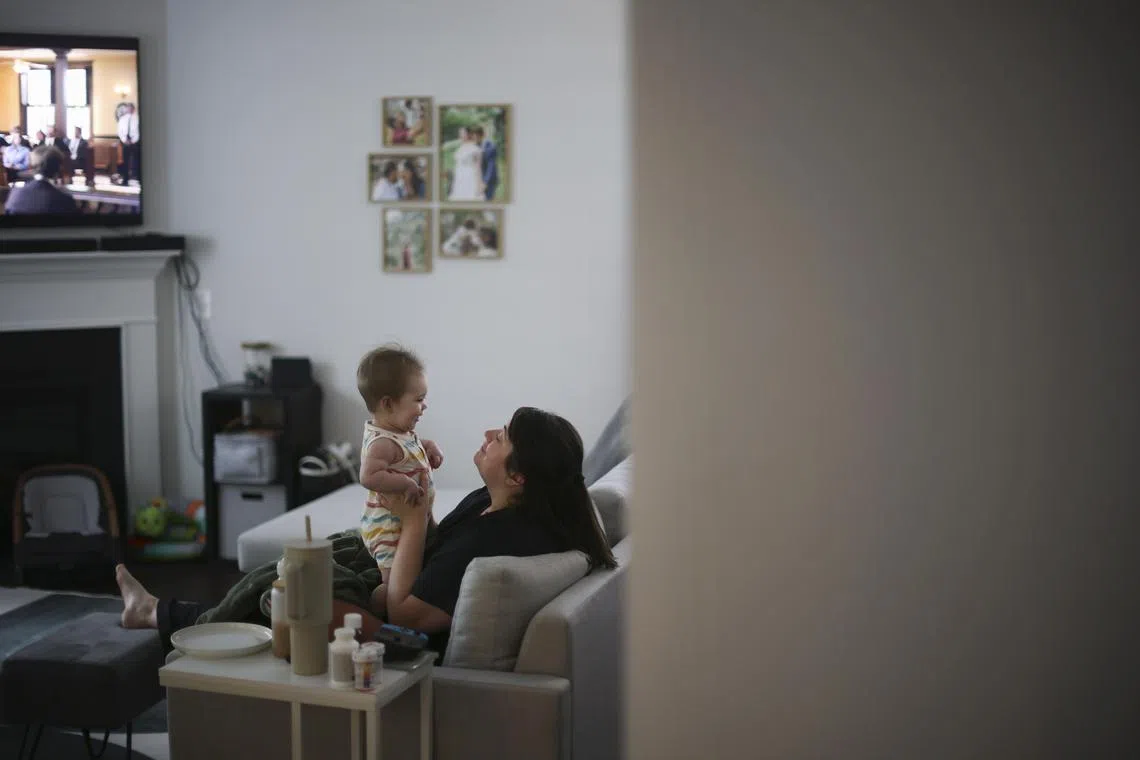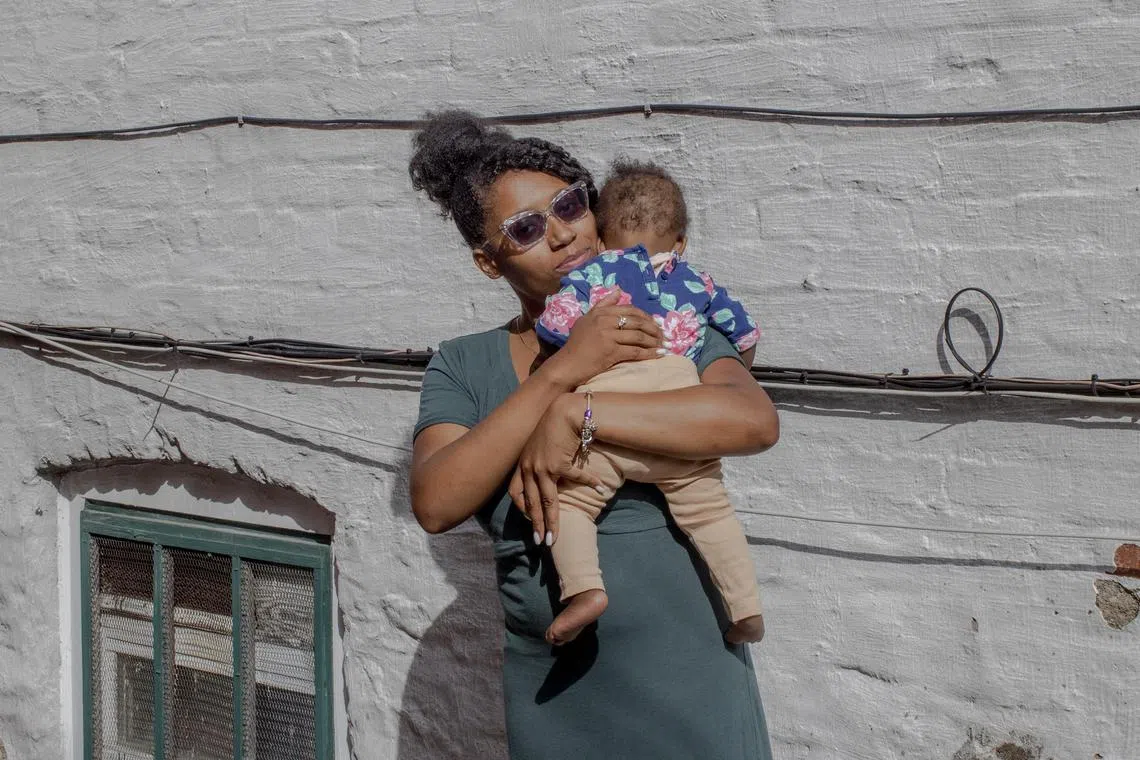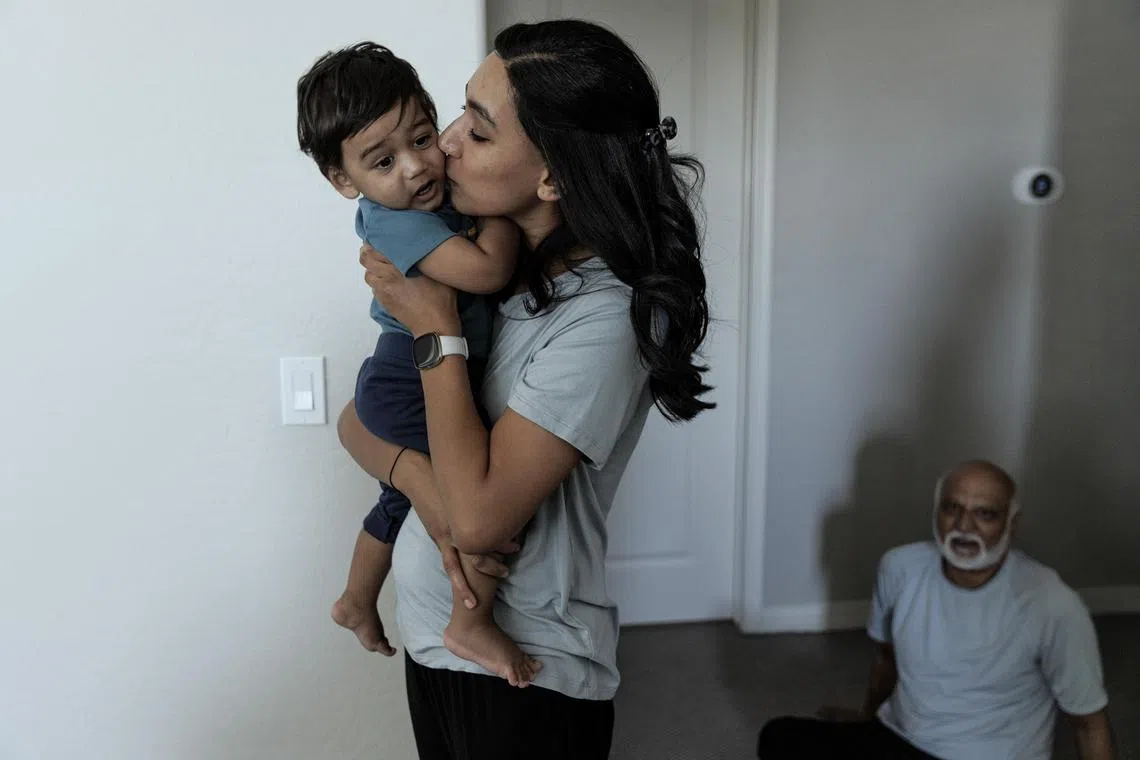Life in the throes of post-partum depression
Sign up now: Get ST's newsletters delivered to your inbox

Ms Allie Strickland has dealt with both post-partum depression and anxiety since the birth of her first child.
PHOTO: NYTIMES
NEW YORK – If you give birth to a baby in the United States in 2023, the odds are you will learn something about post-partum depression along the way – maybe from your doctor, midwife or a celebrity or on social media.
But for many women, post-partum depression is shockingly isolating – a mix of sadness, hopelessness and overwhelm that stems not just from the hormonal tumult of pregnancy and the post-partum period, but from many other stressors, like a lack of paid leave, insufficient childcare and the staggering responsibility of caring for a new and helpless human.
The condition, which can arise at any point during the first year post-partum – and is distinct from the relatively short-lived “baby blues” most women experience soon after delivery – is now recognised as one of the most common complications of childbirth.
It affects one in eight new mums and mental health struggles are a leading cause of pregnancy-related death in the US, primarily from suicide and drug overdose.
There are more treatment options for post-partum depression now, including the first medication designed specifically to treat it. But factors such as stigma and inadequate screening keep many mothers from getting help.
The Centers for Disease Control and Prevention estimates that about 20 per cent of women were not asked about depression during a prenatal visit, and more than half of women with post-partum depression continue to go untreated.
Here are three mothers who share their experiences with post-partum depression.
Allie Strickland
My son was due at the end of September, but in late August, I started having contractions. I think I just went into denial, like, no, he could not possibly be showing up this early.
The birth itself was not a great experience. They set him on my chest and I had time to touch only his back and for me to realise: “Oh. That’s my baby right there.” Then he was gone.
I was so out of it that I kept asking: “Where is he? What’s going on?”
My whole body was filled with panic. But they did give him back to me, and we were able to do skin-to-skin.
On our second day in the hospital, I got hit with the baby blues. If I looked at the baby for too long, I would start crying. If I had to hand him to my husband so I could go to the bathroom, I would start crying.
Once we got home, I put the baby’s bassinet as close to our bed as I could and, even then, I would stay awake and just stare at him.
Nighttime was the worst. As soon as the sun set, I would feel this intense doom: How much sleep will we get tonight? What if we do get sleep and something happens? We had the Owlet monitor sock and the Nanit video monitor, and even then, I would lay there listening to him breathe. I could not look away.
I started working with a therapist before becoming pregnant, and I knew I was at a higher risk for post-partum mental health disorders because I had a history of anxiety and depression.
At three weeks post-partum, I had my medication adjusted. It helped a little, but there was always something for me to feel scared about. Is he getting enough milk? What if something happens while we are out and about?
I recently found a new therapist who works specifically with post-partum mums. I see her twice a month and her office is baby-friendly, so I can take him along. It has not been a cure-all or anything close to it, but she has given me some tools to help me manage my anxiety.
One is a list of questions I can ask myself to try and identify: Is this thought coming from a place of logic? A place of emotion? How likely is it for this thing to actually happen?
It has helped me a lot to know that other mums also experience intrusive thoughts – they are worried when they go to the top of the stairs that they are going to fall and drop their baby, or that something is going to happen while they are driving. But she has helped me understand that just because certain feelings are common, they are not “normal”.
Janelle Jones

Ms Janelle Jones, a nurse and mother of two children, with her eight-month-old daughter, Eva, in Queens, New York.
PHOTO: NYTIMES
I had some depression when I became a parent the first time around. I got treatment, but I feel like it kind of lingered. With the second pregnancy, it came back full force.
It was around six weeks post-partum. My partner actually noticed before I did. He was, like, “Janelle, I think it’s happening again”.
That was also when I started to realise: “Oh my god, I’m going to have to go back to work soon.”
I am a nurse and I had always tied that to my identity, but I started feeling like I did not want to be a nurse anymore.
I could not concentrate on things. I was overstimulated and I was so irritable – with my partner and with my family. I felt like: This is a lot. Did I really want this? It just felt overwhelming.
I would sit on the couch and just watch Netflix. I would try and get up and do something, but it felt like I was stuck.
I started seeing a therapist who works with my gynaecologist’s clinic. It was not a good fit, but she told me about a place called The Motherhood Center that offers a more intensive level of care. You go for full days, from 10am to 3pm.
I knew I needed help, but I also felt like: Am I really that bad, that I need that type of assistance? It was hard to come to terms with the fact that I need mental health help.
I was in the programme from December to February.
A few months after the baby was born, I did have feelings of impending doom, like something bad was going to happen.
I never spoke about that when it was happening because you feel so ashamed. How do you say that out loud? There is such a stigma to all of this – even doing this interview.
I am taking Prozac and continuing with therapy. I am doing better, though I still have hard weeks.
I want people to know that motherhood is so complex and it is beautiful. I think that getting treatment and being vulnerable is so important. It is in the vulnerability that you are able to move forward.
Shivani Hiralal

Ms Shivani Hiralal with her son, Rishav, at home in Phoenix, Arizona. She joined a pregnancy and post-partum mood support group that she said was a source of comfort.
PHOTO: NYTIMES
I struggled a lot with fertility. We tried for a year, and then I suffered a miscarriage. After that, I had an ectopic pregnancy that took three months to diagnose, and then it took us a whole year after that to get pregnant again.
Then a month before our son Rishav was born, my husband developed fungal pneumonia. I had to resuscitate him, and he had to be hospitalised and intubated. I think all of that contributed to what I experienced post-partum.
I was in a lot of pain after the birth, to the point where I could not really sit up in bed, and I was just really, really exhausted. I was also having a hard time breastfeeding.
When it was time for Rishav’s first paediatrician’s appointment, I had my husband and my mum take him because I could not move, I could not sit – everything was uncomfortable. I cried the entire time they were gone. I felt like such a failure of a mother.
Every time I had Rishav at the breast, I started to cry. I dreaded feeding him every two hours. I knew he was relying on me for food, but it was hurting me and he was not getting enough, and it just felt like too much.
I switched to exclusive pumping, but I had a lot of guilt, pain and shame around breastfeeding. I did not feel that immediate, instant connection to him.
I did have moments when I wondered whether my son was better off without me.
When I was around four or five weeks post-partum, I met my therapist (I had been in therapy before, and scheduled the appointment when I was still pregnant) and told her: “I am crying all the time. I do not think this is the baby blues.”
At my six-week post-partum check-up, something still felt wrong physically. My gynaecologist referred me to a pelvic floor physical therapist and urogynaecologist.
Then she started getting ready to leave the room and I was like: “Wait. Before you go, there’s something I really want to speak to you about, which is my mental health.”
And that was when I started crying. She thanked me for bringing it up, and told me that because of how busy things are, she is not always able to.
I had a urinary tract infection and the urogynaecologist diagnosed me with prolapse. I later saw a pelvic floor physical therapist.
At around nine months, I started feeling better emotionally. I think a lot of that had to do with the fact that I was finally doing much better physically. I am still healing, but now that my son is turning one, I look back at that whole experience in awe.
I am, like: Wow. I made a lot of progress. I guess there is a message of hope in here. NYTIMES


